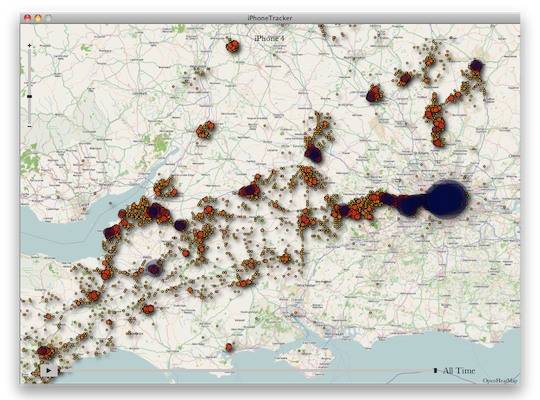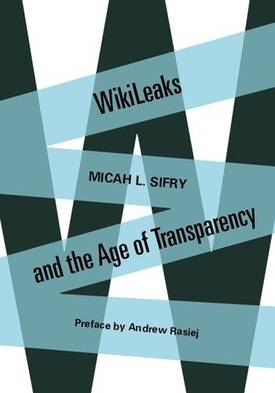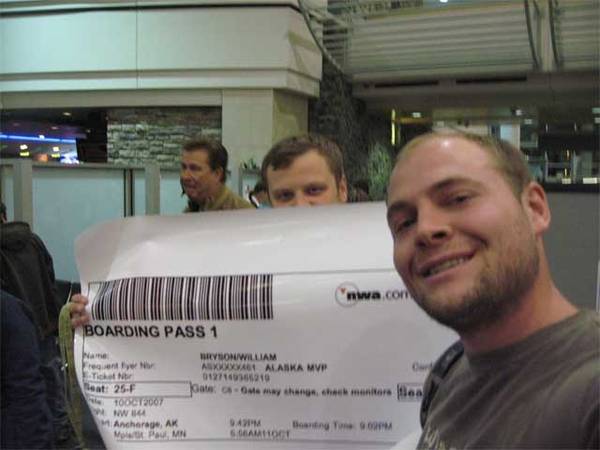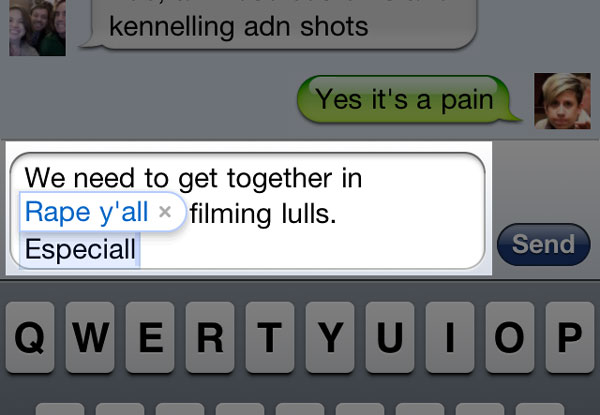The Latest from Boing Boing |  |
- Xerox's first successful copier burst into flame so often it came with a fire-extinguisher
- Mail Rail: London's long-lost underground postal railroad
- Weird Al snubbed by Lady Gaga, releases his parody without permission as fair use
- Autocorrect's dishonorable intentions
- Diary (2010), by Tim Hetherington
- TIME tribute to Tim Hetherington and Chris Hondros, photojournalists killed today in Libya
- Bury, don't shred your documents
- Florida Pirate Party candidate
- Modern Paleo magazine
- To do in Austin, TX: "Third Annual Funky Chicken Coop Tour"
- Two photojournalists killed in Libya
- Company buys up 1.7 million 1-800 numbers, uses many for phone sex lines
- Two NASA astrophysics projects get the axe due to budget cutbacks
- Engineering a real-life "Star Wars" AT-AT
- Speaking of our microbial overlords ...
- Railgun fires Hugo Awards through steel plates and then 7km further
- Roomba's cousins are helping out at Fukushima
- Do bacteria control your brain?
- HOWTO dig a kids' pirate cave
- Who was this Rube Goldberg guy, anyway?
- Behold: The world's most complicated Rube Goldberg machine
- Man in electric wheelchair chases woman for three days (?) (!)
- How do you compete with free? A taxonomy of reasons to pay for digital files
- iOS devices secretly log and retain record of every place you go, transfer to your PC and subsequent devices
- ACLU to Michigan cops: stop searching mobile phones during traffic stops
- WikiLeaks and the Age of Transparency: Micah Sifry explores the history, successes and failures of online transparency
- Printing your boarding card out REALLY BIG
- Books by dictators
| Xerox's first successful copier burst into flame so often it came with a fire-extinguisher Posted: 20 Apr 2011 10:50 PM PDT  Behold, 1959's groundbreaking Xerox 914, the first successful plain-paper photocopier, weighing in at 648 lbs, making a whopping 136 copies/hour. Much beloved for its propensity to burst into flame while operating, an occasion considered so normal by the manufacturer that they shipped it with a small fire-extinguisher, euphemistically called a "scorch guard." Xerox 914 (Thanks, Fipi Lele!) (Image: Xerox_914, Wikimedia Commons/Xerox) |
| Mail Rail: London's long-lost underground postal railroad Posted: 20 Apr 2011 10:18 PM PDT  A group of intrepid London explorers found an entrance to the long-abandoned postal rail system, which once whisked mail across the city through a network of underground tunnels. They walked miles of track, stopped in several stations, and lavishly documented the journey with photos and text. What an adventure! For as long as i can remember, explorers have joked, discussed, cried themselves to sleep over possibilities the Post Office Railway could be explored. Those keen to attempt entry desperately clawing at every scrap of information like a starving hobo snacking on bread crumbs. Just the idea of access, let alone the task of traversing the line seemed fraught with impossible obstacles and doubt.The Post Office Railway (Mail Rail) (Thanks, Ben!) |
| Weird Al snubbed by Lady Gaga, releases his parody without permission as fair use Posted: 20 Apr 2011 10:09 PM PDT My movie agent, Justin Manask, also represents Weird Al Yankovic. I grew up with Allan Sherman albums and MAD Magazine flexidiscs, so when I first heard Weird Al, I knew I'd found my kind of guy. Justin wrote to me last night: "You're going to love this. Lady Gaga denied Weird Al the right to release his parody of BORN THIS WAY, only the second time in his career that he's been denied [ed: the other refusal came from Prince]. But he recorded the track at her request as a part of the approval process... the first time any artists has made that request. She summarily passed without comment. So instead of selling a couple hundred thousand or a million copies... he gave PERFORM THIS WAY away for free to his 2 million followers on Twitter." The ensuing hoo-hah seems to have swayed Ms Gaga, who has authorised the inclusion of PERFORM THIS WAY on Weird Al's album. |
| Autocorrect's dishonorable intentions Posted: 20 Apr 2011 09:28 PM PDT |
| Diary (2010), by Tim Hetherington Posted: 20 Apr 2011 03:46 PM PDT Diary (2010) from Tim Hetherington on Vimeo. "Diary' is a highly personal and experimental film that expresses the subjective experience of my work, and was made as an attempt to locate myself after ten years of reporting. It's a kaleidoscope of images that link our western reality to the seemingly distant worlds we see in the media."—Tim Hetherington, British photojournalist and Academy Award-nominated documentary filmmaker, who was killed today in Libya. (via Clayton Cubitt) |
| TIME tribute to Tim Hetherington and Chris Hondros, photojournalists killed today in Libya Posted: 20 Apr 2011 05:43 PM PDT 
Ben Cosgrove of LIFE says, In light of today's shattering news about Tim Hetherington and our colleague, Getty photographer Chris Hondros, we did the only thing we could to keep from going crazy with anger and sadness: we built galleries of their work -- including the genuinely frightening pictures that Chris made today in Misrata, Libya, shortly before he was so badly injured (above, and below). Getty has since confirmed that Chris Hondros also died from his wounds. |
| Bury, don't shred your documents Posted: 20 Apr 2011 02:23 PM PDT  I had 52 pounds of documents that I needed to get rid of securely. My wimpy shredder would choke on that much paper, and the quotes I got from onsite shredding services were too costly for me. So, I dug a hole in my backyard and buried the papers. I'm curious to find out how long it will take for the papers to decompose. I wasn't sure that the hole I dug was big enough to hold all the papers.
It turns out there was room to spare! I mixed in as much dirt as I could to accelerate the composting process. |
| Florida Pirate Party candidate Posted: 19 Apr 2011 10:36 PM PDT The Florida Pirate Party has fielded a candidate in for House Representative from District 86: "With your help, we can bring the state of Florida into the new digital age, in a free and open manner run by the people, and for the people." (Thanks, arbitraryaardvark!) |
| Posted: 20 Apr 2011 12:13 PM PDT |
| To do in Austin, TX: "Third Annual Funky Chicken Coop Tour" Posted: 20 Apr 2011 11:50 AM PDT If you're in Austin this Saturday, check out the third annual Funky Chicken Coop Tour--there's no food more sustainable and local than eggs from your own backyard! We also have an Info Center with a drawing for a free chicken coop, along with other cool chicken-related prizes. It's a free, self-guided tour using maps downloaded from our website. You can also see some of the coops on videos. Above: Coop #8 on the 2011 Austin Funky Chicken Coop Tour map.Video Link. |
| Two photojournalists killed in Libya Posted: 20 Apr 2011 11:39 AM PDT "In besieged Libyan city of Misrata. Indiscriminate shelling by Qaddafi forces. No sign of NATO." — One of the last Tweets posted by British photographer Tim Hetherington, before he and Pulitzer-winning photojournalist Chris Hondros were killed while documenting the civil war in Libya. Hondros is known for his gut-wrenching photographs of the war in Iraq, photos that got him kicked out of the U.S. military unit he was embedded with in 2005. (EDIT: It's currently unclear whether or not Chris Hondros was killed, but he is reported to have been seriously injured.) |
| Company buys up 1.7 million 1-800 numbers, uses many for phone sex lines Posted: 20 Apr 2011 10:11 AM PDT  AP reports that PrimeTel Communications has, for the last 13 years, been buying up every desirable 800 number on the market. They behave not unlike domain name prospectors who do the same with web addresses, only they convert many of these numbers into phone sex lines. The company now controls 1.7 million toll-free numbers, which represent about 25% of all 800 numbers in the U.S. and Canada. Among them: 1-800-Metallica, 1-800-Cadillac, 1-800-Minolta, 1-800-Cameras, 1-800-Worship and 1-800-Whirlpool. AP reports that the connection between the speculation activity and the phone-porn activity is this: A-1 Advertising, an actual phone sex business, shares a building, owners, and executives, with the company doing the 800 number buying. More: Critics of the company say it isn't the sex that bothers them, but the acquisition of so many numbers. Bill Quimby, whose company, TollFreeNumbers.com, specializes in helping businesses obtain easy-to-remember digits to connect with customers, said it can be a challenge to find a good match because PrimeTel has gobbled up such an outsized share of the supply. Porn company collecting 1-800 numbers (Associated Press) Via Dr. Ruth Westheimer, who is totally awesome on Twitter. She comments, I would have thought with so much free porn available on the internet that phone sex would have gone the way of the dodo bird. You mean 1-800-SEXY DODO. (via Consumerist, photo by Rob Beschizza via BB Flickr Pool) |
| Two NASA astrophysics projects get the axe due to budget cutbacks Posted: 20 Apr 2011 09:50 AM PDT NASA is shutting down LISA, the Laser Interferometer Space Antenna, and the International X-Ray Observatory, due to budget cutbacks. Reports PopSci, the "gigantic laser experiment intended to study the nature of gravity and an x-ray telescope designed to look at black holes are being swept into the dustbin of history, too big and too expensive to survive the federal budget ax." |
| Engineering a real-life "Star Wars" AT-AT Posted: 20 Apr 2011 09:34 AM PDT  At Innovation News Daily, science journalist Jeremy Hsu explores what it would take to make Mike Koehler's AT-AT For America dream a reality.
Innovation News Daily: Could America Really Build a "Star Wars" AT-AT Walker? |
| Speaking of our microbial overlords ... Posted: 20 Apr 2011 09:25 AM PDT The wreck of the Titanic is being devoured by a microbial super-organism that communicates via some kind of electrical or chemical quorum sensing. |
| Railgun fires Hugo Awards through steel plates and then 7km further Posted: 19 Apr 2011 10:38 PM PDT General Atomics' new railgun uses a high-speed sabot (which looks suspiciously like a Hugo Award) that is fired with such force that it travels for 7km after punching through a steel plate. "We were launching hypersonic bricks at Mach 5, Mach 6″ (via Geekologie) |
| Roomba's cousins are helping out at Fukushima Posted: 20 Apr 2011 09:04 AM PDT It took a while, but there are, now, some freaking robots helping out at Fukushima. At least some are made by iRobot, the same company that produces friendly vacuums and less-than-friendly unmanned military drones. |
| Do bacteria control your brain? Posted: 20 Apr 2011 08:56 AM PDT  A new study has found evidence suggesting that you are not what you eat, so much as you are what's living in your gut. In mice, at least, the presence of normal gut bacteria has a significant impact on how an individual mouse behaves, and how its brain develops.
Personally, I'd like to see more analysis on what these findings mean. The Scientific American story quoted above makes it sound like normal gut bacteria are, on the whole, kind of cramping the brain's style. Given the evidence that exists about healthy gut bacteria's importance to maintaining other aspects of physical health, I'm curious whether this study implies that we humans have accepted a bit of a trade off. We get gut bacteria that help us digest food and train our immune systems—but we loose some control over how our brains function, possibly to our detriment, but possibly not, depending on the circumstances. Oh, and, before the rest of you get a chance, I'm going to jump in here and make the obvious comment: "I, for one, welcome our new E. coli overlords." Scientific American: The Neuroscience of the Gut Via Matt Feltz |
| Posted: 20 Apr 2011 08:47 AM PDT  This 1929 Modern Mechanics HOWTO explains to young people how they can dig their own pirate's cave, complete with working fireplace. The author explains that mothers can allow their sons (yes, it was all pretty gendered back then in 1929-land) to build such a clubhouse without fear, because the design will prevent cave-ins. Articles like this fill me with sorrow and delight: sorrow because you couldn't include such a place in a work of fiction (letalone a factual article aimed at children) today; delight at the adventure that those who followed these directions back in the 20s and 30s must have had. Save all the flat stones for the fireplace, unless bricks are available. The latter will make a better fireplace, however, without mortar. The roof or ceiling joists should extend at least a foot on each side of the excavation. The ridge support is made up of two two-by-fours laid one on top of the other, as shown in the diagram. The roof boards should be covered with tar paper or old canvas, or in a pinch, several layers of newspapers. At one end of the roof, tack heavy wire screen under the gable, and further protect this with a row of slats set at an angle. These are to partially support large stones placed against them to conceal the vent. If the stones are big enough they will not impede air circulation to any great extent. A trench is dug for the stove-pipe and, when this is laid, covered over again with dirt. Of course, it will be an advantage to have the chimney as far away from the cave as your supply of stove-pipe will permit. However, be sure that the top of the chimney is one or two feet higher than the stove. Otherwise your draft will be sluggish. Stones should be piled around the chimney to hide it, and it wouldn't be a bad idea to throw over the chimney itself some old junk, such as rusty washboilers, etc., that will not interfere with draft. In case a potential enemy sees smoke rising he naturally would assume it to be a rubbish fire.Digging a Pirate's Cave |
| Who was this Rube Goldberg guy, anyway? Posted: 20 Apr 2011 08:27 AM PDT Writing the last post, it occurred to me that I had no idea who Rube Goldberg, the actual person, was. Turns out, he was an artist who drew cartoons parodying the machines-can-fix-anything philosophy of early 20th-century America. Pressured into an engineering degree by his father, Goldberg designed sewer systems for the city of San Francisco before quitting to become a cartoonist. As far as I can tell, he never built any of the machines that were named after him, just drew them (luckily for the city of San Francisco). But his legacy continues to inspire engineers to explore their artistic sides. Read a short bio or check out the official Rube Goldberg website. |
| Behold: The world's most complicated Rube Goldberg machine Posted: 20 Apr 2011 08:12 AM PDT It may not portray the most accurate representation of science (or history), but this Rube Goldberg machine designed by engineering students at Purdue does tell a compelling story, and, with 244 steps to water a single flower, it does earn the title of World's Most Complicated Rube Goldberg contraption—edging out previous record holders at Michigan's Ferris State University, who'd built a machine with 230 steps. Popular Mechanics has an inside look at the machine, and how it was created. |
| Man in electric wheelchair chases woman for three days (?) (!) Posted: 19 Apr 2011 10:30 PM PDT A 67-year-old man is alleged to have knocked a woman off her bicycle with his electric wheelchair in a parking lot in Ft Pierce, Florida. He is alleged to have broken her bicycle. This occurred, it is alleged, after he had chased the woman around the parking lot for three days before she called the cops or anyone noticed or he ran out of battery (the article is unclear on this score). I don't understand this story. Oh, wait. According to commenters on the story, it may be that, on three consecutive days, he chased the woman around this parking lot. On the third day, he caught her. I still don't really understand. Cyclist says man in electric wheelchair chased her around Fort Pierce parking lot for three days (via Neatorama) |
| How do you compete with free? A taxonomy of reasons to pay for digital files Posted: 20 Apr 2011 07:32 AM PDT My latest Guardian column is "In the digital era free is easy, so how do you persuade people to pay?" and it's a first approximation of a taxonomy of reasons to buy stuff that you can download for free from unauthorized sites. I find that discussions about digital sales are often muddied by arguments about whether a particular strategy is good or bad for business, and I hope that by enumerating as many of the selling-propositions as we can and the strategies that complement or undermine them, we can improve the debate: Buy this because you're supporting something worthwhileIn the digital era free is easy, so how do you persuade people to pay? |
| Posted: 20 Apr 2011 07:00 AM PDT  Security researchers presenting at the Where 2.0 conference have revealed a hidden, secret iOS file that keeps a record of everywhere you've been. The record is synched to your PC and subsequently resynched to your other mobile devices. The file is not transmitted to Apple, but constitutes a substantial privacy breach if your PC or mobile device are lost or seized. The researchers, Alasdair Allan and Pete Warden, have released a free/open application called "iPhone Tracker" that allows you to retrieve the location data on your iOS device and examine it. They did not discover a comparable file on Android devices. The file contains the latitude and longitude of the phone's recorded coordinates along with a timestamp, meaning that anyone who stole the phone or the computer could discover details about the owner's movements using a simple program.iPhone keeps record of everywhere you go |
| ACLU to Michigan cops: stop searching mobile phones during traffic stops Posted: 19 Apr 2011 10:20 PM PDT The ACLU is trying to get the Michigan state cops to stop dumping mobile phone storage during routine traffic stops. At present the Michigan troopers use something called a Cellebrite UFE that slurps up recently dialled numbers, SMSes, Facebook/Twitter posts, emails, bookmarks, Web history, cookies, notes, MMS, IMs, lists of recent Bluetooth devices, journeys, GPS fixes, call logs, and a list of your contacts. According to the ACLU's letter, the organization requested usage logs from the Michigan troopers' devices, but the state police requested more than half a million dollars to pay for retrieval of the documents and records, which the ACLU claims is unreasonably high. In a statement to PM, Tiffany Brown of the Michigan State Police said: "The Michigan State Police will provide information in accordance with the Freedom of Information Act (FOIA). As with any FOIA request under statute, there may be a processing fee to search for, retrieve, review, examine and separate exempt materials, if any."Should Cops Be Allowed to Scan Your Phone During a Traffic Stop? (via /.) |
| Posted: 20 Apr 2011 07:41 AM PDT  Micah Sifry's WikiLeaks and the Age of Transparency is a thoughtful and thought-provoking look at the promise and limits of Internet-based transparency efforts. Sifry looks at everything from digital sunshine laws to the Iranian election to Cablegate, and examines what has worked to make the world's governments and corporations more accountable and when technology-driven transparency efforts have failed. His postmortem on the Obama administration's largely abandoned transparency efforts are particularly sharp, especially in light of how much mileage the few successful government transparency projects delivered. Micah Sifry's WikiLeaks and the Age of Transparency is a thoughtful and thought-provoking look at the promise and limits of Internet-based transparency efforts. Sifry looks at everything from digital sunshine laws to the Iranian election to Cablegate, and examines what has worked to make the world's governments and corporations more accountable and when technology-driven transparency efforts have failed. His postmortem on the Obama administration's largely abandoned transparency efforts are particularly sharp, especially in light of how much mileage the few successful government transparency projects delivered. No book about transparency and politics would be complete without a look at Wikleaks and Julian Assange, and Sifry takes great pains to separate issues with Assange's personal life and management style from the power and danger of Wikileaks-style sites, as well as the power and risk of denial-of-service attacks like those staged under the Anonymous banner on Wikileaks' behalf. This is more than an account of the successes and failures in online transparency: it's a kind of roadmap for activists who want to use the Web to make the powerful more accountable -- and who worry that technology might be used to hide a multitude of sins and cover them up with meaningless gestures towards transparency. |
| Printing your boarding card out REALLY BIG Posted: 20 Apr 2011 05:52 AM PDT  Back in October 2007, Bill Bryson (not the author, a different Bill Bryson) printed out his boarding pass on a giant sheet of poster paper about 3' x 1.5'. He had quite an adventure. After my extremely long flight down to Minneapolis I headed into the World Club (NWA's rendition of the Board Room). When you enter their facility with an Alaska Airlines board room pass you need to show them a NWA ticket to get in. So I handed them my board room card and unrolled my boarding pass on the counter. The two ladies looked at each other and started laughing. They called over the other people working in the world club over to take a look. They asked me if I had won a trip or something. I told them that I was just doing it to get a smile out of people. They laughed and told me to have a nice day. One of them said that they'd like to see the gate agent try to scan that thing in.Have you ever printed a boarding pass? (via Uncertain Principles) |
| Posted: 20 Apr 2011 05:44 AM PDT From Saddam's novels to Gadaffi's rambling political treatise, authoritarian tyrants can't resist the cachet of authorhood. Among the few to attain a degree of competence were Stalin and Khomeini--poets both. [Foreign Policy] |
| You are subscribed to email updates from Boing Boing To stop receiving these emails, you may unsubscribe now. | Email delivery powered by Google |
| Google Inc., 20 West Kinzie, Chicago IL USA 60610 | |

 Well now.
Well now.


 I filled the top foot of the hole with dirt. Mission accomplished, along with some pleasant outdoor exercise!
I filled the top foot of the hole with dirt. Mission accomplished, along with some pleasant outdoor exercise!
 Gray, who police said appeared "very intoxicated," denied doing anything. He then offered the woman money to repair the bike.
Gray, who police said appeared "very intoxicated," denied doing anything. He then offered the woman money to repair the bike.
Tidak ada komentar:
Posting Komentar